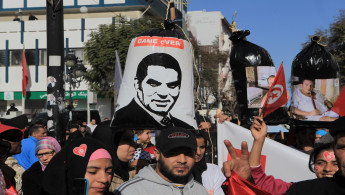Tunisian court orders Ben Ali assets to be returned
Tunisia's administrative court has issued a ruling, overturning a presidential decree to confiscate the assets of deposed Tunisian President Zine el-Abidine Ben Ali and members of his family.
The government estimated the confiscated assets to be worth approximately $13 billion. They include companies, yachts, real-estate, luxury cars and other assets.
The decree was overturned on Wednesday after an appeal from Ben Ali's family. It was first issued in March 2011, shortly after the revolution that ousted Ben Ali.
Judicial sources said the ruling was reached on a technicality, as the presidential decree had not been put before the parliament, and was therefore not approved by the Constituent Assembly.
| The ruling might cost the government billions of dollars in compensation. -Ahmad Sawab, administrative court judge |
The government is expected to appeal the court ruling and correct its procedures around the asset stripping.
Hatem el-Euchi, the minister of state property, described the court ruling as "very dangerous and shocking" in a statement to Tunisian reporters.
Timing
The ruling sent shockwaves through the country, coming as the country's Truth and Dignity Commission prepares to question officials in the Ben Ali regime.
"The confiscation decree took place in extraordinary circumstances during the government of Mohamed Ghannouchi, and it was not presented to the legislative institutions, which is why the court has overturned it," said Mohammed al-Garaya, an economic expert.
After the 2011 revolution that put an end to Ben Ali's 23-year rule, the government issued a decree confiscating the assets of 114 people - including Ben Ali, and his wife Leila, and a number of business owners and officials associated with the regime.
Ahmad Sawab, an administrative court judge, said the ruling overturning the confiscation might cost the government billions of dollars in compensation, as 527 companies were seized, in addition to assets such as real-estate.
Many of the organisations seized by the state have proven far from profitable, stymying officials' attempts to swell government coffers. Administrators face huge inherited losses, fearsome bank debts, and a bill for salaries and back pay not received since Ben Ali's era.
Of funds and assets believed to have been smuggled outside the country by Ben Ali, the Tunisian state has only been able to secure a $28 million cheque from a Lebanese bank - the balance of a neglected bank account belonging to Leila Ben Ali, and two yachts, one from Spain and another from Italy.
According to Tunisian observers, the confiscation decree was one of the most important decisions made by the government after the revolution, and that it was in line with the revolution's demands.
This is an edited translation from our Arabic edition.



